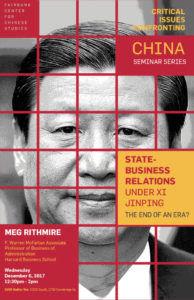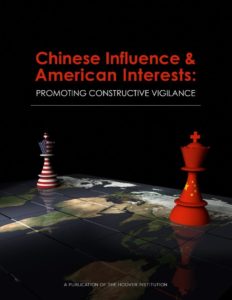A China é diferente, como alerta esta matéria de Democracy Digest: é uma grande civilização, que já era um Estado avançado muitos séculos atrás, que decaiu durante dois ou três séculos, mas que vem se recompondo, como a maior ditadura burocrática existente em todos os tempos. Um Estado orwelliano, diferente do stalinismo idiota dos bolcheviques.
Essa situação precisa ser reconhecida pelos pesquisadores.
Paulo Roberto de Almeida
Adversary or enemy? China is ‘unlikely to simply collapse’
The Soviet Union and its satellites were an apparatus of state terror, resting on an ideology of class hatred, foisted on nations that wanted no part of either. It was always a house of cards, says analyst Bret Stephens. China is not like that. It’s a regime, but it’s also a nation and a civilization, and the three are tightly woven. It will evolve one way or another, but it’s unlikely to simply collapse, he writes for The New York Times:
 Since Xi Jinping came to power in 2012, China has behaved in increasingly nefarious ways. Domestically, it has shifted from one-party to one-man rule and become a surveillance state that locks up innocent people by the hundreds of thousands in concentration camps. Abroad, it snoops, steals, kidnaps, cheats, pollutes, undermines, corrupts, proliferates, and bullies. …China also poses an underappreciated danger. By many measures, it has already peaked. Its economy is sliding; its debt is exploding; its population is aging; its workforce is shrinking; and its most successful citizens are leaving. Rising powers can bide their time. Declining ones — at least authoritarian ones — tend to take their chances.
Since Xi Jinping came to power in 2012, China has behaved in increasingly nefarious ways. Domestically, it has shifted from one-party to one-man rule and become a surveillance state that locks up innocent people by the hundreds of thousands in concentration camps. Abroad, it snoops, steals, kidnaps, cheats, pollutes, undermines, corrupts, proliferates, and bullies. …China also poses an underappreciated danger. By many measures, it has already peaked. Its economy is sliding; its debt is exploding; its population is aging; its workforce is shrinking; and its most successful citizens are leaving. Rising powers can bide their time. Declining ones — at least authoritarian ones — tend to take their chances.
And yet, Stephens adds…… As the Canadian scholar Michael Ignatieff once pointed out (in a different context), there’s a difference between adversaries and enemies — between those whose designs “you want to defeat” and those whose very existence “you have to destroy.”
 Xi is now engaged in ideological competition with liberal democracy, invoking cultural diversity as a pretext for asserting Beijing’s sharp power, reports suggest.
Xi is now engaged in ideological competition with liberal democracy, invoking cultural diversity as a pretext for asserting Beijing’s sharp power, reports suggest.
Although information is increasingly globalized and internet access is spreading, China and other authoritarian states have managed to reassert control over the realm of ideas, Christopher Walker, Vice President at the National Endowment for Democracy, told the House Permanent Select Committee on Intelligence hearing on China’s emerging digital authoritarianism and global influence operations (above).
For its part, the National Endowment for Democracy (NED) and its associated institutes have set in motion a response to this multifaceted challenge, he added:
NED’s programmatic approach to addressing China’s influence around the world that threatens democratic norms, standards and institutions is anchored in three interrelated components: developing and accelerating the capacity of think tanks, civil society and journalists to study and analyze Chinese influence in politics, the economy and society; strengthening the ability of these actors, including those working in the civic technology space, to respond appropriately and strategically; and linking efforts at the country level with counterparts engaged in similar work around the world.
On Thursday, May 16 at 9 am, the House Permanent Select Committee on Intelligence addressed China’s emerging digital authoritarianism and global influence operations targeting the United States and its partners (above):
Under President Xi Jinping’s leadership, China is deploying on an unprecedented scale a pervasive surveillance network that harness advances in emerging technologies – including artificial intelligence and machine learning – to eliminate domestic political dissent and optimize the Chinese Communist Party’s (CCP) political control. Alarmingly, China is exporting this model of technology-driven social control to countries throughout the world, contributing to an international resurgence in and slide towards authoritarianism in many emerging democracies.
In addition to the NED’s Walker, the Committee has invited the following witnesses to attend:
- Dr. Samantha Hoffman – Non-Resident Fellow at the Australian Strategic Policy Institute’s International Cyber Policy Centre
- Peter Mattis – Research Fellow in China Studies at the Victims of Communism Memorial Foundation
- Dr. Jessica Chen Weiss – Associate Professor of Government at Cornell University
 Among other issues, the Committee will seek testimony about:
Among other issues, the Committee will seek testimony about:- China’s adoption and exportation of invasive surveillance measures designed to optimize political control, including the social credit system and Huawei’s “Safe City” solution;
- China’s overseas influence operationstargeting the U.S. and Five Eyes governments, including the activities directed by the Chinese Communist Party’s (CCP) United Front Work Department; and
- The Chinese Communist Party’s return to a personalistic dictatorship model, rising nationalist sentiment within China, and the implications of Beijing’s efforts to challenge the international order.

Nenhum comentário:
Postar um comentário